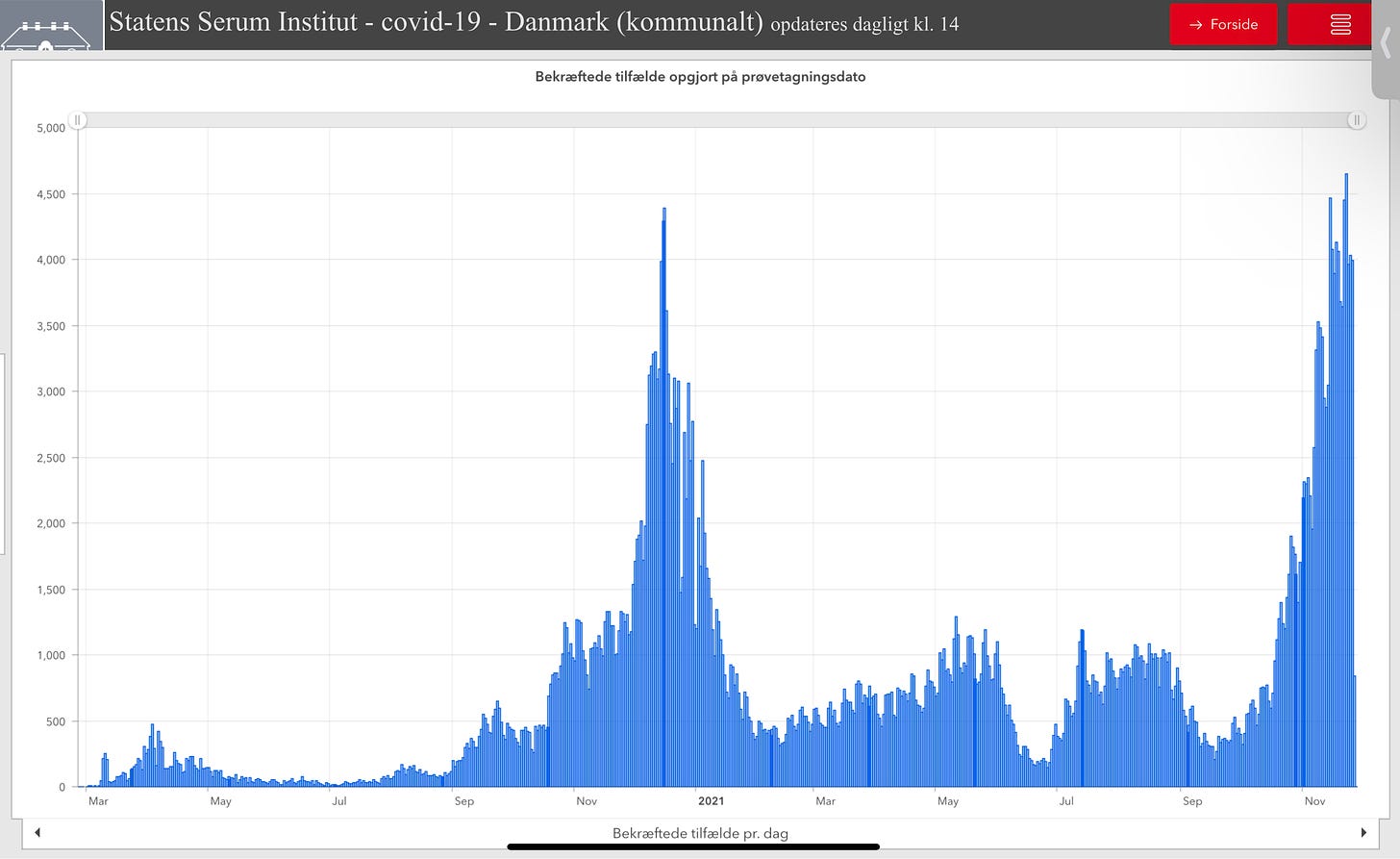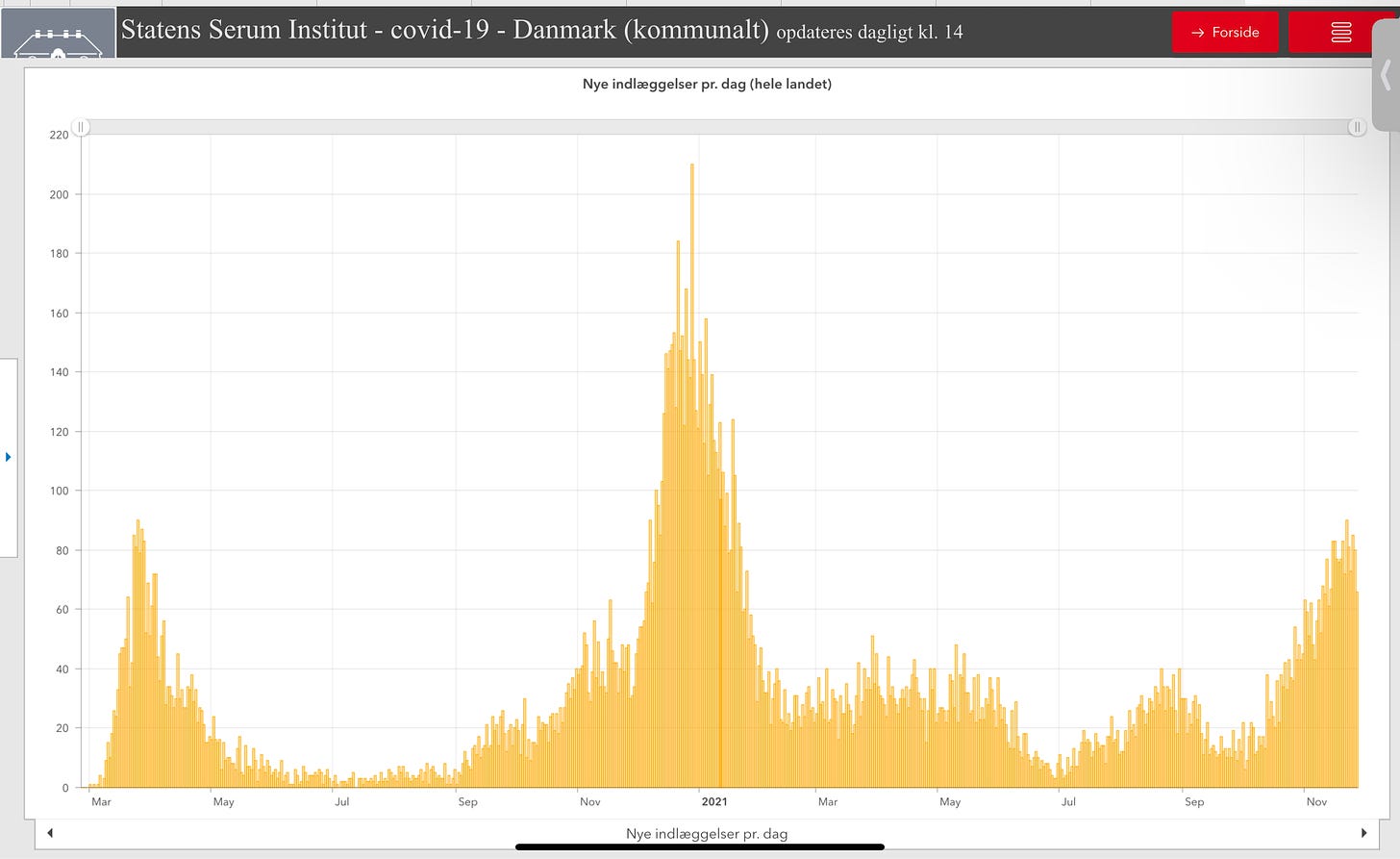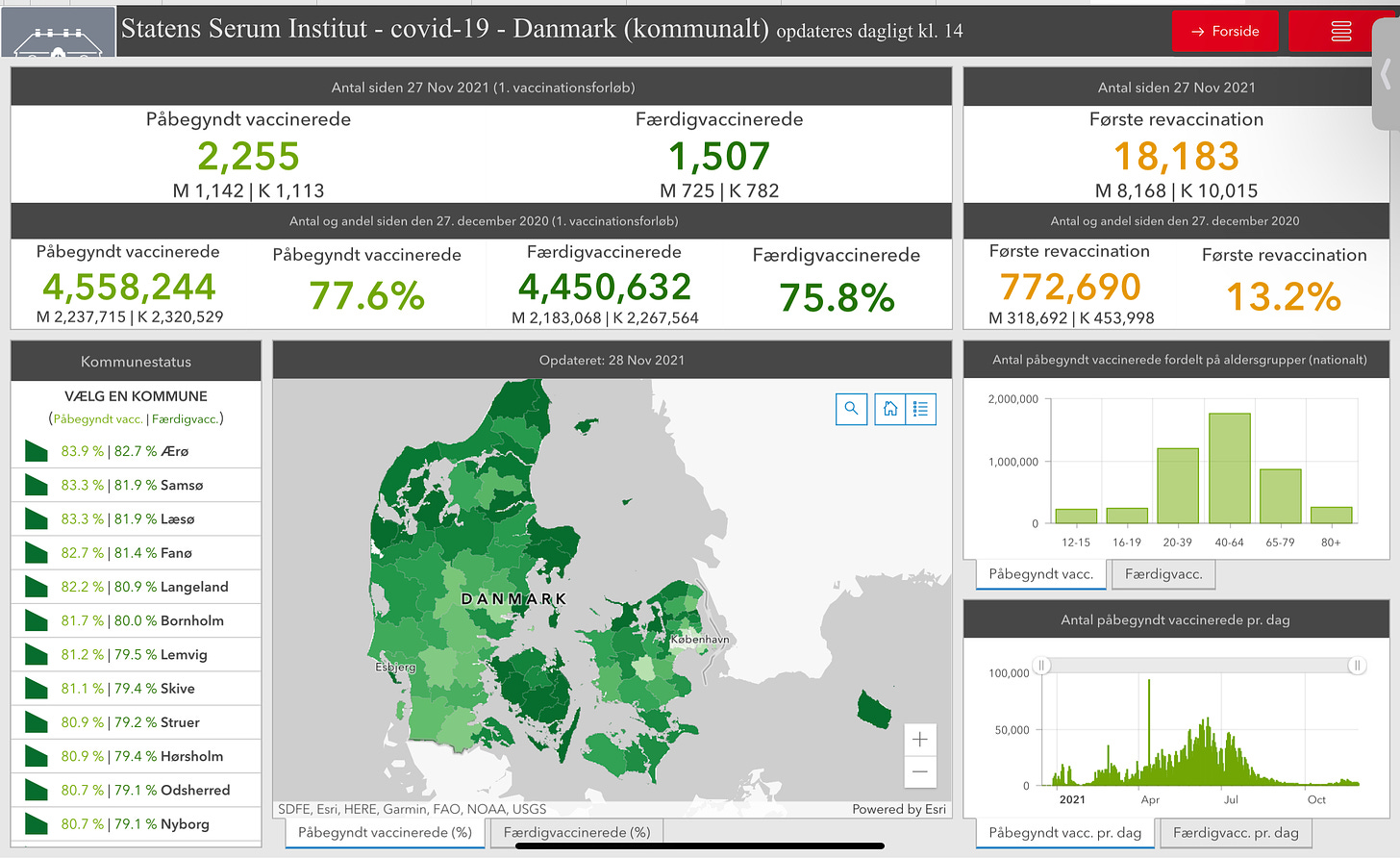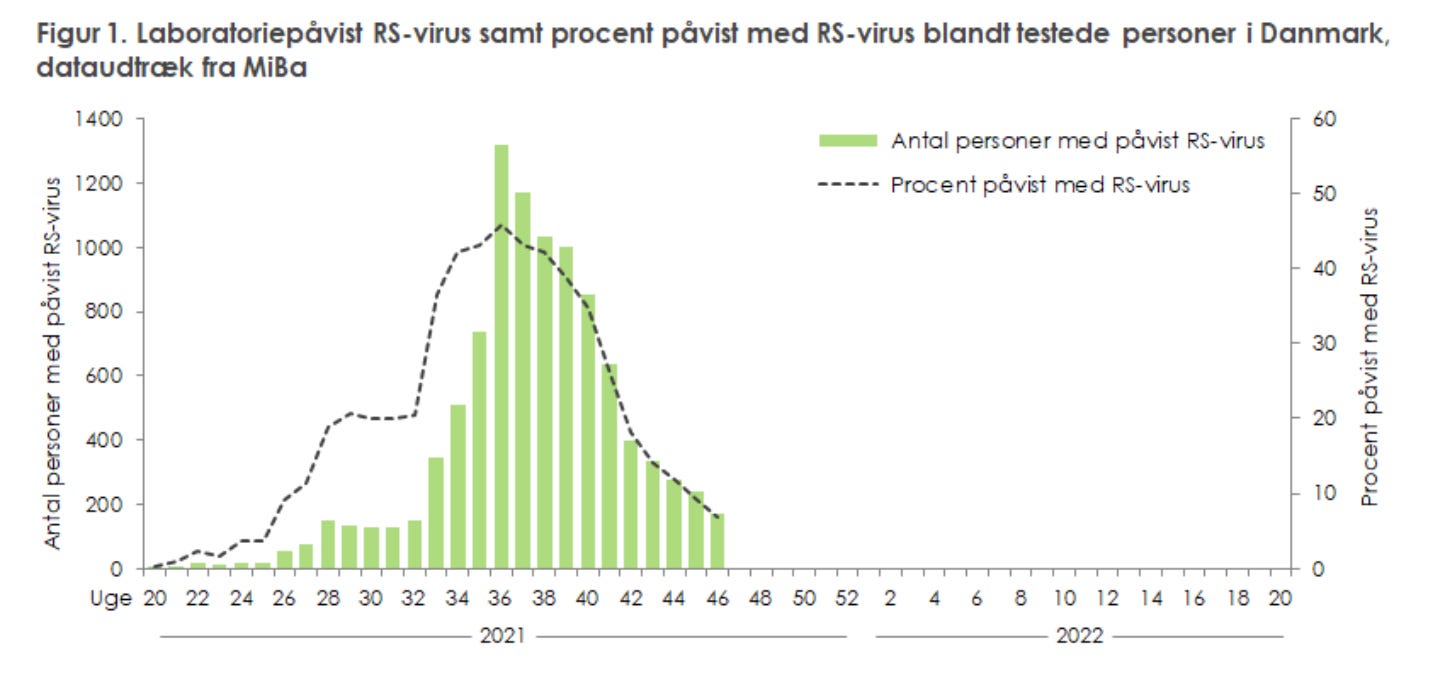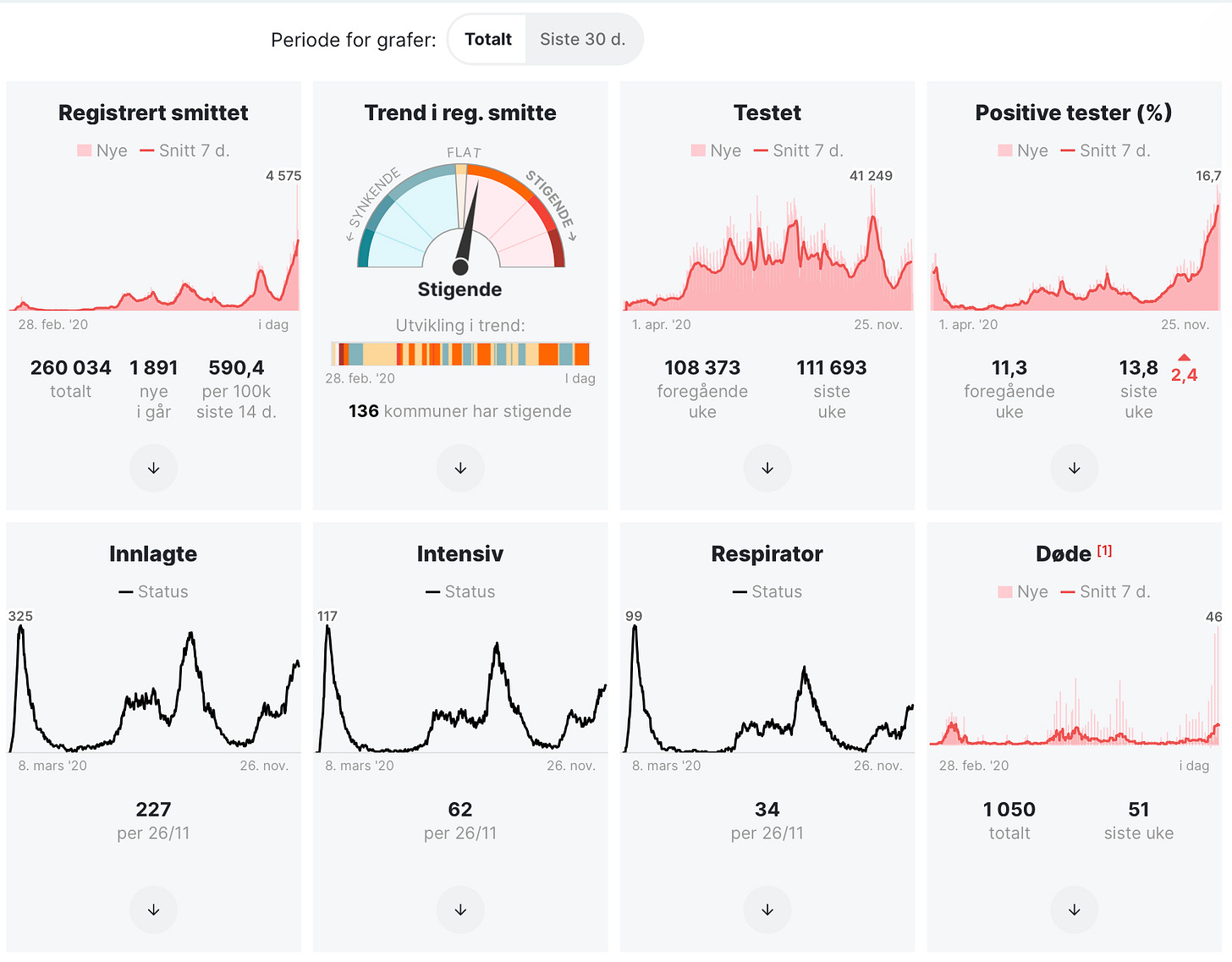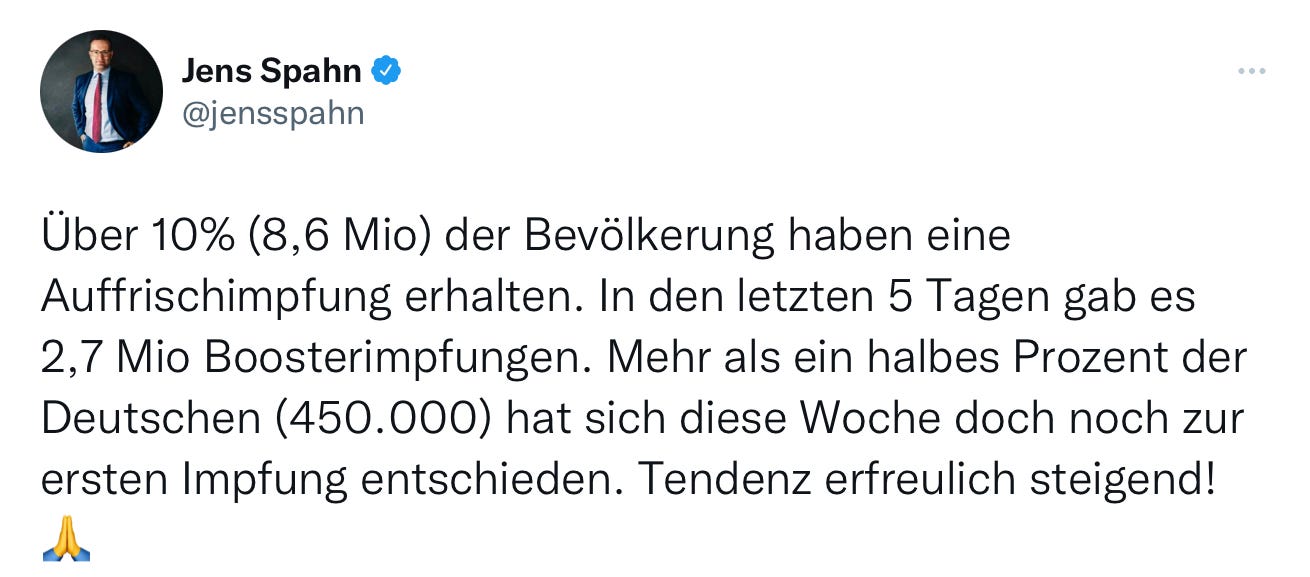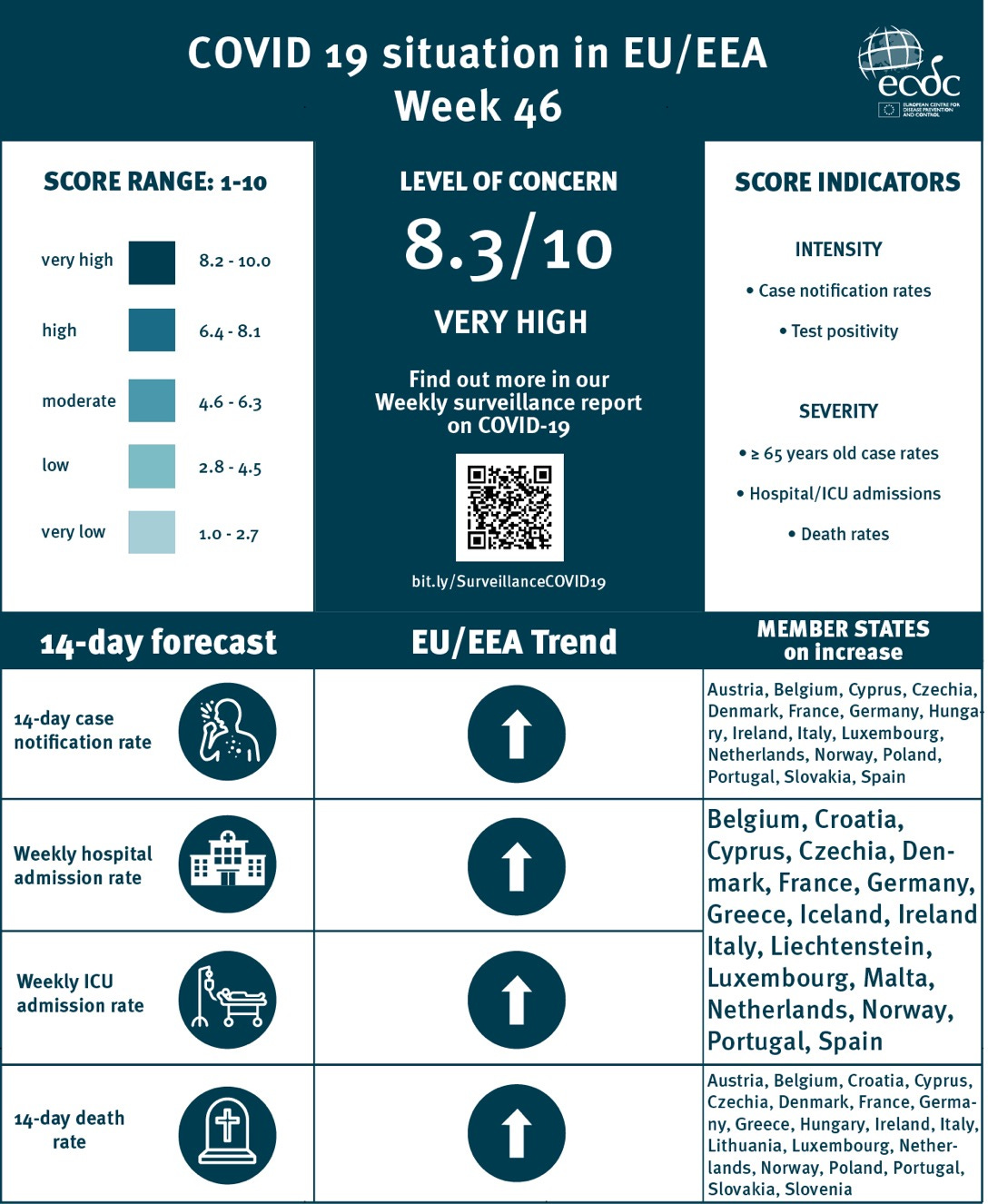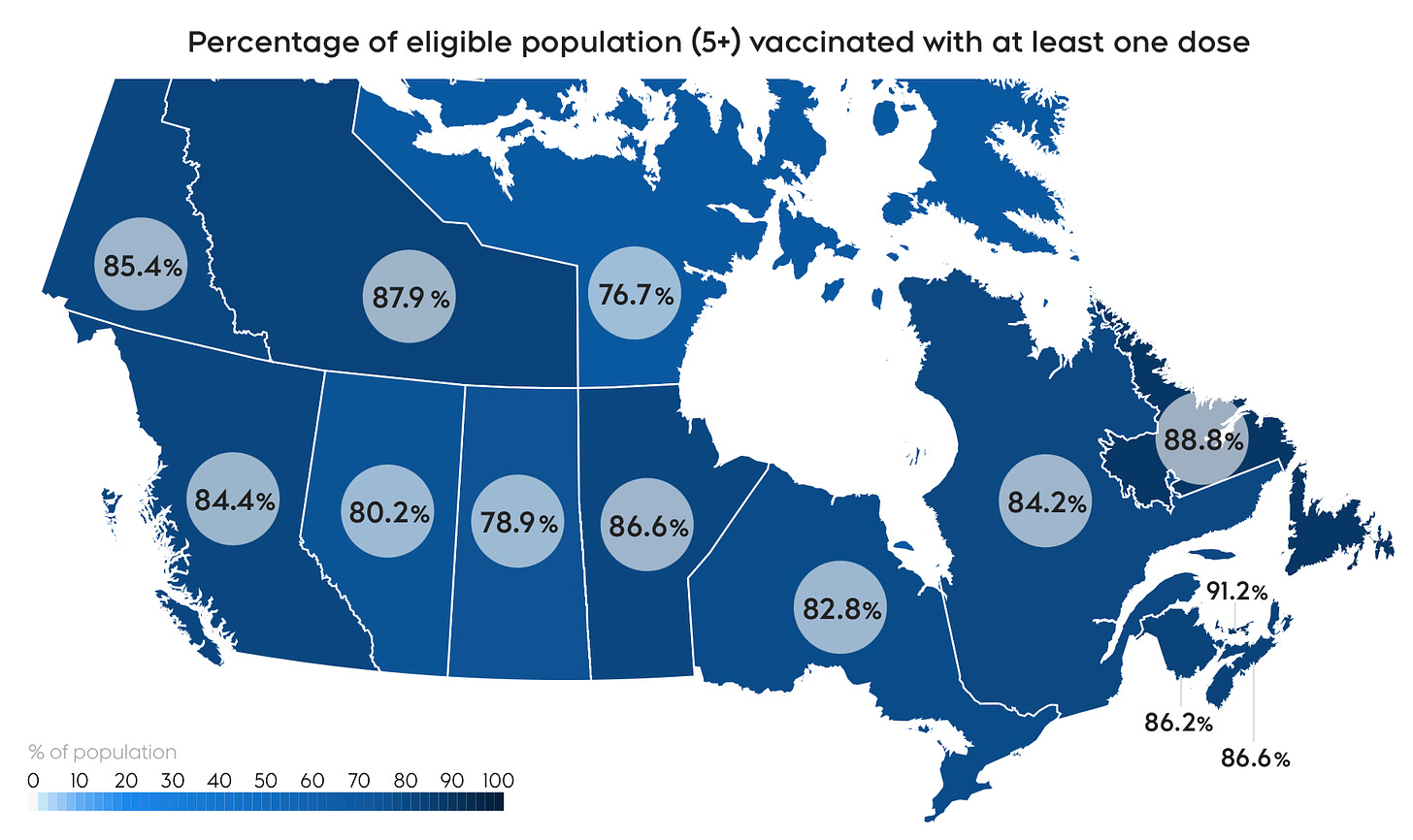Monday Morning News & Notes
The Omicron variant spreads despite a bevy of travel bans and restrictions
🇩🇰
Denmark officially has its first two cases of the Omicron COVID variant. The Staten Serum Institut said on Sunday that genome sequencing of two positive test results came back positive for the new variant.
SSI Director Henrik Ullum:
“We have now completed the complete genome sequencing of the PCR samples from the two travelers, and can now confirm that there are two cases of the virus variant Omicron. This was to be expected, and our strategy is therefore to continue intensive monitoring of the infection in the country. We want to buy as much time as we can to continue to get people vaccinated and get as far through winter as we can before the variant really begins to make its presence felt in Denmark, as we suspect it will.”
The SSI says the two people confirmed to be infected with the variant are in quarantine and urgent efforts are underway to track down their close contacts. As well, authorities are trying to track down anyone they shared a flight with. According to the Danish Agency for Patient Safety, the two arrived in Denmark on separate flights and landed in different airports. One of them flew in onboard flight KL1129, flying from Amsterdam to Copenhagen on November 23. The other arrived a day later on flight KL1345, flying from Amsterdam to Billund.
The agency told Ritzau that is has already identified 48 people who are first or second hand contacts.
Deputy Director Birgitte Drewes says they are also making progress on tracking down their fellow passengers.
“We are up to a few hundred people, so it goes fast when you go out in the third ring of contacts. That is why we only do it when it comes to these worrying variants.”
Close contacts and everyone who was on either flight are advised to quarantine and get a PCR test immediately. A second PCR test should be taken a few days later and both tests should come back negative to break quarantine.
-
Remember to mask up and make sure your coronapas is good to go. As of today, face masks are once again required in shops, grocery stores, and if you are visiting a hospital or any other healthcare facility. As well, the coronapas requirement has also been broadly reinstated and will likely be checked heading into schools, some workplaces, restaurants, museums, theaters, even some church services, baptisms, and other venues and activities. For a better idea of where masks and a coronapas requirements apply, you can go HERE.
Also remember as of today, the validity of a negative PCR and rapid test has been shortened. A negative PCR test is only valid for 72 hours and a rapid test for 48.
It isn’t just shops, grocery stores, and other indoor places, as masks are also mandated on all public transit for everyone 12 years old and older as of today. This applies to buses, trains, and ferries and even domestic flights. And for those set to take a driving test, this will also require a coronapas, according to Denmark’s Transportation Ministry.
Transportation Minister Benny Engelbrecht:
“We saw last year how quickly people on public transit adapted to having to wear masks, therefore, I am very confident that we can again ask everyone to take extra care of each other by using a mask on public transit. A mask is a small thing for the individual, and it helps to slow down the infection’s spread, so we hopefully avoid major shutdowns.”
The requirement to mask up also applies when in a taxi, or on long distance buses, or tourist buses.
-
Denmark added 12,110 COVID infections and 31 coronavirus deaths since its update on Thursday. 4,076 infections were reported on Friday, 3,744 on Saturday, and another 4,290 on Sunday.
There were 308,512 total corona tests done on Saturday, of which 186,100 were PCR tests equaling a positivity percentage of 2.30%.
Denmark is quickly approaching the 500,000 total to-date infections mark and steadily moving towards passing 3,000 total pandemic deaths.
-
COVID hospitalizations (435) continued to march upwards (+17) while the number of infected people in an ICU (51) inched upwards (+1) and of those the number on a ventilator (34) also rose (+5).
-
In its latest weekly assessment, the Danish National Health Board says it is seeing a worrying strain on Denmark’s healthcare system as COVID infections surge.
Deputy Director Helen Probst:
“We are concerned about the high burden on hospitals, and it is not just about COVID admissions, but a number of combined factors. We are in close dialogue with the regions about the situation at the hospitals, and must at the same time do everything we can to get even more people vaccinated, so we can bring infection rates in the community down.”
The health board is now recommending a COVID vaccine booster doses for everyone 18 years and older six months after having a second dose.
“Having two vaccine doses and a booster shot are the best tools to avoid serious illness and hospitalization. Our recommendation is that you accept a booster dose offer as soon as you receive the invitation.”
She notes the five Danish health regions are all ramping up vaccination capacity to get as many 1st, 2nd, and booster doses administered as possible.
-
On Saturday, there were 21,945 total vaccinations done across Denmark while the lion’s share continues to be booster doses there were another 2,255 people who had their 1st vaccine dose, which is good news. Denmark is steadily moving towards having 80% or more of its total population with at least one vaccine dose.
-
Region Hovedstaden says over 60 children received their first dose of the Pfizer pediatric COVID vaccine in Metro Copenhagen on Sunday. This was the first day of vaccinating children 5 to 11 years old in Denmark. On Friday, the Danish National Health Board gave its stamp of approval to vaccinating young children after the European Medicines Agency recommended approval for the Pfizer/BioNTech pediatric vaccine a few days earlier.
-
The massive RS virus wave continues to ease across Denmark as overall infections and the positivity percentage dropped for a week. Hospitalizations from respiratory infections also diminished, going from 95 in week 45 to 78 in week 46.
So far, there is still no sign of a feared epic influenza wave in Denmark as activity on the seasonal flu front remains somewhat subdued.
🇩🇰 🇨🇭
The Danish Foreign Affairs Ministry issued an advisory on Sunday night that as of midnight Sunday, anyone flying from Denmark to Switzerland must go into a mandatory 10 day quarantine upon arrival. This is due to concerns over the Omicron variant after Denmark confirmed its first two variant infections.
🇸🇪
Sweden will table its first COVID update of the week on Tuesday.
-
The Swedish Public Health Agency is warning that COVID infections are on the rise in Sweden “albeit from low levels.” The agency says it is important to slow the infection spread down. As a result restrictions will be tightened as of December 1.
Agency Director Karin Tegmark Wisell:
“The most important thing you can do as an individual to protect yourself and others is to get vaccinated. However, in environments with many people, such as large gatherings, there is a risk of spreading the infection, and therefore, the new regulations and general guidelines focus on some of those scenarios. They make it possible for those responsible for events and activities to ensure that people who have not been vaccinated can follow the advice to keep their distance from others.”
As of December 1:
A vaccine passport system comes into force.
All organizers of public gatherings and indoor events must take certain basic infection control measures. These include providing information on how the spread of infection can be avoided and opportunities for attendees to wash their hands or use hand sanitizer.
If vaccination certificates are used at indoor public events and public gatherings with more than 100 participants, the organizer must have a written plan for how the certificates are to be checked. People under the age of 18 do not have to show proof of vaccination.
If vaccination certificates are not used at such events and gatherings, the organizer must instead take special infection control measures. Participants must have designated seating, groups at the event are capped at a maximum of 8 people, and groups must be able to keep a distance of at least one meter from each other.
For other events, shops, and retail spaces
Avoid congestion and crowding among, customers, visitors, or attendees.
Stagger customer arrival times
Avoid physical line ups
Use different “and specially specified” entrances and exits for all participants or customers.
-
Sweden has levied its own travel restrictions due to concerns about the Omicron variant. The Swedish Public Health Agency is urging anyone who has been in South Africa, Lesotho, Botswana, Zimbabwe, Mozambique, Namibia or Eswatini in the last week or so to isolate immediately and get a PCR COVID test ASAP. They should then take another test five days later. This applies to everyone regardless of their vaccination status.
Agency Director Agency Director Karin Tegmark Wisell in an email to SVT! admitted hopes are not high that much can be done to keep the variant out at this point.
“Intensified monitoring of variants is ongoing and we expect to find cases in Sweden because it has already spread to several other countries in Europe. Currently, all positive samples are sequenced after a trip abroad (provided that the amount of virus in the sample is high enough to allow sequencing) and about 40% of all positive samples within Sweden. Sequencing for new variants is performed if necessary, even on weekends.”
Sweden is so far leaning on the EU flight ban on all incoming flights from any of the seven African countries of concern instead of levying its own restrictions on incoming travelers. Sweden currently requires all travelers coming from outside the Nordics to have proof of vaccination, recovery from a recent infection, or a recent negative COVID test in order to enter the country.
🇫🇮
Finland does not update COVID numbers on weekends. We will get a better idea of the situation there when three days worth of data is tabled later today. Finland went into the weekend with a record high number of daily infections on Thursday and then promptly set another record high on Friday.
-
On Sunday, Finland closed its borders to all travelers who have been in Botswana, Eswatini, South Africa, Lesotho, Mozambique, Namibia, or Zimbabwe for any period within the previous two weeks of arriving at the Finnish border. The on,y exceptions are Finnish citizens, permanent residents, and for certain essential reasons like “a compelling family matter.” The entry ban will remain in place until at least December 19.
Due to concerns about the Omicron variant, Finnish health authorities have instructed municipalities along the borders, or who have a port, or airport to “implement health security measures, i.e. compulsory health examinations, for people entering the country.”
🇳🇴
Norway has added 4,426 infections and had no new corona deaths since its Friday update.
COVID hospitalizations (227) have increased (+6) while the number of infected people in an ICU (62) is unchanged and of those the number on a ventilator (34) has dropped slightly (-3).
So far, 78.6% of Norwegians 12 years old and older have had one vaccine dose, 70.8% have had two doses, and 9.4% have had a booster dose.
-
The Norwegian Institute of Public Health says it has not seen any sign of the new Omicron variant yet, but cautioned that doesn’t mean it isn’t in Norway already.
Director Camilla Stoltenberg says it is very likely the variant may be in Norway and other European countries but just hasn’t been identified yet. Stoltenberg said while it is concerning the preliminary evidence seems to show the Omicron strain outpacing the Delta variant in Southern Africa, we shouldn’t assume the same will happen in Europe.
“There is still very limited knowledge about this new variant. There is therefore great uncertainty about the properties of the variant and its further development. The knowledge will increase day by day.”
While there are lots of key questions remaining unanswered about the variant, the NIPH believes existing vaccines will still offer a high level of protection against serious disease, hospitalization, and death.
That said, Norway is taking what it calls “precautionary measures” to delay the introduction and spread of the virus, to buy time to accrue more knowledge about the variant and get people vaccinated.
The measures include;
Putting all hands on deck in monitoring for variants.
Municipalities to ramp up vaccinations, especially for booster doses, to better protect the population and curtail any local outbreaks.
Although the health agency notes:
“For the time being, it is desirable to stop any local outbreaks of the Omicron variant in Norway, but if the variant has a significantly greater infections rate than the Delta variant, it is not possible to prevent it from becoming the dominant variant.”
If that is the scenario that ends up happening, the NIPH says the fall back plan is to try and protect the healthcare system while trying to buffer society from unduly harsh restrictions.
Minister of Health Ingvild Kjerkol says as part of the buying time strategy, Norway is tightening border restrictions.
“The health authorities' goal is to delay the spread in Norway. The government is therefore introducing targeted entry measures to limit imported infections from countries in southern Africa. This means increased control at the border and mandatory quarantine hotels for travelers from the countries in question.”
The “countries in question” are South Africa, Namibia, Zimbabwe, Botswana, Mozambique, Lesotho, Eswatini, and Malawi. Norway now advises against all unnecessary travel to any of these countries.
And as of Sunday morning:
Everyone arriving in Norway from any of the eight African countries must have a negative COVID test before boarding their flight, they will be tested again on arrival, and again on day 7.
Direct flights from all eight countries to Norway are banned.
Regardless of vaccination status, all travelers from the region must quarantine for ten days in a government quarantine hotel.
If a person tests negative “no earlier than three days into quarantine” then the rest of the quarantine can be served in their own home or a suitable residence where contact with others can be avoided.
A negative PCR test no earlier than day seven ends the quarantine.
Anyone who has arrived in Norway between November 16 to the 27 from any of the eight African countries should get a PCR test as soon as possible.
All of this will be enforced via a “special control effort” by Norwegian police.
🇩🇪
In the German state of Hessen, home to Frankfurt airport, genome sequencing has confirmed a woman who flew back from South Africa about a week ago does in fact have the Omicron variant. Then, hours later, health officials in Hessen said they have identified four more suspected variant infections.
-
German Health Minister Jens Spahn says 8.6 million people have had a COVID vaccine booster dose so far, which is over 10% of the population. Spahn says from Monday to Friday last week there were 2.7 million booster doses administered.
He says he is also very encouraged by a rising number of people who have had their 1st vaccine dose last week with 450,000 people getting their first shot. Germany, which is being battered by a brutal 4th wave driving daily infections up to record highs, has been struggling with some sub-standard vaccination rates.
Spahn says they will have a lot of vaccine doses on hand to keep up the pace of vaccinations this week. Germany saw seven-million doses delivered last week. This week, he says, Pfizer/BioNTech will deliver over three-million doses, and Moderna will also provide up to eight-million vaccine doses. Spahn says all told, Germany will have a stockpile of 14 million doses to be used this week.
🇫🇷
Health authorities in France say they have eight suspected infections cases of the Omicron variant. All eight are people who have been in South Africa recently.
🇳🇱
Of the more than 600 people who landed in Amsterdam on flights from South Africa on Friday, Dutch health officials said 61 have tested positive for the coronavirus and of those, 13 have now been confirmed to be Omicron variant so far. Genome sequencing of the positive test results for the other passengers is still pending.
🇨🇭
It was a yes to the coronapas in Switzerland on Sunday. People in the country voted on whether to maintain the law upholding the vaccine passport system. 62% of Swiss voters said ‘yes’ to keeping the coronapas system in place.
🇪🇸
As of December, Spain will require British travelers to show proof of COVID vaccination as the country tightened travel rules over fears of the new Omicron coronavirus variant.
🇪🇺
The latest European Centre for Disease Prevention and Control paints another grim picture in its latest weekly assessment of the COVID situation in Europe. The ECDC says while epidemic situation varies from country to country, the overall rate of infections, deaths, and hospitalizations across the EU continue to rise. The EU health agency is forecasting numbers will continue to increase across Europe over the next two weeks. It says infections rates are highest in European countries with the lowest vaccination rates as the Delta variant continues to storm around the continent. Of all sequenced positive test results across Europe, the Delta variant accounted for 99%
The latest weekly assessment says for a seventh straight week the COVID incidence rate in the EU has increased, going from 485.5 per 100,000 residents to 612.2 from one week to the next. While infection rates are highest among those under the age of 50 the ECDC says case numbers among older age groups “are also rapidly increasing.” Death rates have also been slowly rising. The agency says among the 28 EU countries sharing data on hospital and ICU numbers, 22 of them reported numbers were trending upward in one or both cases.
The ECDC report has eight countries Croatia, Czechia, Germany, Greece, Hungary, the Netherlands, Poland, and Slovakia, as very high COVID concern. 14 countries including Denmark, Finland, Norway, Austria, and France are in a group considered as high concern. Sweden, Italy, and Spain are among eight countries deemed to be a moderate risk.
🇬🇧
The UK has confirmed a 3rd Omicron variant case. The UK Health and Security Agency says it identified the variant in a person who tested positive after traveling to the United Kingdom. The agency says the person is linked to travel to South Africa but the person “is no longer in the UK.” It says targeted contact tracing is being done at locations the person visited in Westminster, London.
🦠🌍
The latest WHO threat assessment on the Omicron-COVID variant indicates the jury is still out on a lot of key questions. Whether it is more infectious or if it causes more severe illness than other variants like the Delta, the WHO says “it is not clear yet.”
While the global health agency notes case numbers are rapidly rising in areas of South Africa impacted by the new variant “epidemiologic studies are underway to understand if it is because of Omicron or other factors.” Similarly, while hospitalizations in South Africa are also rising “this may be due to increasing overall numbers of people becoming infected, rather than a result of specific infections with Omicron.”
The WHO does say that preliminary evidence does indicate the variant may have an increased risk of reinfection for those who have already had COVID. But it also adds on that front, too, information is limited, saying “more information on this will become available in the coming days and weeks.”
The health agency it is launching studies and inviting other national health authorities to share any and all information to try and gather more knowledge about the variant, including on vaccine effectiveness.
Until then, the WHO is advising countries to keep using restrictions and other measures to get infections down. It also strongly recommends people keep social distancing, wear a mask, keep indoor spaces well ventilated, keep up good hand hygiene, and get vaccinated to reduce the risk.
💉🌍
As concerns rise over the new Omicron variant, Pfizer/BioNTech says it is already working to analyze the strain to ensure its COVID vaccine remains effective against it. The vaccine maker expects to have an answer one way or another within a couple of weeks. Should it be necessary, the company says it can produce a reformulated vaccine to combat the variant within 100 days.
🇿🇦
As country after country brings down travel bans on South Africa and a number of its neighbouring countries, the President of South Africa is not happy. President Cyril Ramaphosa called the travel bans “discriminatory” against his country without doing anything to actually solve the Omicron variant problem.
Speaking to Reuters President Ramaphosa said a more productive approach would be to address vaccine inequality in developing countries.
“Instead of banning travel, rich countries should give priority to helping developing countries in their fight against COVID.”
🇨🇦
The Omicron variant has arrived in Canada as provincial health officials in Ontario say they have two confirmed variant infections. The two infection cases are people “with recent travels to Nigeria.” Both are in isolation and contact tracing efforts are underway.
-
The Canadian government COVID dashboard is no longer updated on weekends, so we will have to wait until later today to get a better sense of the national picture.
-
On the vaccination front so far, 30,213,504 1st vaccine doses (79.02% of the total population) have been administered while 28,947,820 people (75.71%) have been fully vaccinated. To date, 858,239 people have received a booster shot.
-
Of the provinces that do report on weekends:
Ontario added 2,745 new infections from Friday through the weekend. It reported 927 COVID cases on Friday, 854 on Saturday, and its highest number of daily infections since the end of May with 964 on Sunday. Of those, 1,487 are people with one vaccine dose or none at all. There are 122 people in hospital and 135 in an ICU.
Numbers are also headed upward in Quebec as it registered 3,083 new corona infections from Friday through Sunday. Two out of the last three days saw daily infections top 1,000 in the province, something that hasn’t been seen since May.
In Atlantic Canada, New Brunswick logged another 229 COVID cases over the last three days.




